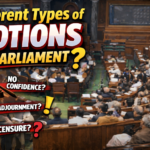Powers of Lok Sabha and Rajya Sabha

LOK SABHA AND RAJYA SABHA
Under Article 75(3) of the Constitution, the Council of Ministers is collectively responsible to the Lok Sabha which means the Rajya Sabha cannot make or unmake the Government. To resolve a deadlock between the two Houses, in the case of ordinary legislation, the Constitution provides for the joint sitting of both Houses. Issues in joint sitting are decided by a majority of the total number of members of both Houses present and voting.
However, in the case of a Money Bill, there is no provision in the Constitution for a joint sitting of both Houses as Lok Sabha enjoys pre-eminence over Rajya Sabha in financial matters.
As regards a Constitution amendment Bill, it has been provided in the Constitution that such a Bill has to be passed by the specific majority, as prescribed under Article 368 of the Constitution, by both Houses. There is, therefore, no provision for resolving a deadlock between the two Houses in regard to a Constitution amendment Bill.
Ministers may belong to either House of Parliament. The Constitution does not make any distinction between the Houses in this regard. Every Minister has the right to speak and take part in the proceedings of either House but he is entitled to vote only in the House of which he is a member.
Other important matters in respect of which both Houses enjoy equal powers are the election and impeachment of the President, election of the Vice-President, approving the Proclamation of Emergency, the proclamation regarding the failure of constitutional machinery in States, and financial emergency.
Special Powers of Rajya Sabha
Rajya Sabha being a federal chamber enjoys certain special powers under the Constitution. All the subjects/areas regarding legislation have been divided into three Lists – Union List, State List, and Concurrent List. Union and State Lists are mutually exclusive – one cannot legislate on a matter placed in the sphere of the other.
However, if Rajya Sabha passes a resolution by a majority of not less than two-thirds of members present and voting saying that it is “necessary or expedient in the national interest” that Parliament should make a law on a matter enumerated in the State List, Parliament becomes empowered to make a law on the subject specified in the resolution, for the whole or any part of the territory of India. Such a resolution remains in force for a maximum period of one year but this period can be extended by one year at a time by passing a similar resolution further.
If Rajya Sabha passes a resolution by a majority of not less than two-thirds of the members present and voting to declare that it is necessary or expedient in the national interest to create one or more All India Services common to the Union and the States, Parliament becomes empowered to create by law such services. Under the Constitution, the President is empowered to issue Proclamations in the event of a national emergency, in the event of failure of constitutional machinery in a State, or in the case of financial emergency. Every such proclamation has to be approved by both Houses of Parliament within a stipulated period. Under certain circumstances, however, Rajya Sabha enjoys special powers in this regard. If a Proclamation is issued at a time when Lok Sabha has been dissolved or the dissolution of Lok Sabha takes place within the period allowed for its approval, then the proclamation remains effective, if the resolution approving it is passed by Rajya Sabha within the period specified in the Constitution under articles 352, 356 and 360




0 Comments